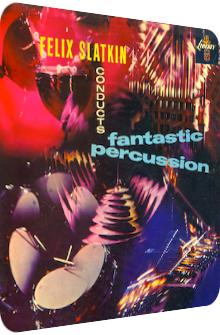
Felix Slatkin
Fantastic Percussion
1960
Vivid violinist and conductor Felix Slatkin (1915–1963) is usually keen on the string-fueled way of life, enchanting with spacy violin veils in legato lands, but then again, one cannot pinpoint the style of the artist all too narrowly, and an album such as Fantastic Percussion delineates this in more than just one way. Released right at the start of a new decade in 1960 on Liberty Records and sporting the usual array of 12 compositions that go from mild to wild and anything in-between, the album’s primary style is unexpectedly spliced, cut and chopped, resulting in a parade of mallet instruments, orchestra bells, chimes and whistles as well as towering timpani, granular harpsichords and alto flutes from the jungle amid the occasional guitar.
Notice that I do not mention any bongos, congas or other devices, and here the good-natured ploy of Fantastic Percussion comes into play: jazzy and orchestral at once, the comparatively obvious secret to the magic of Fantastic Percussion can be found in the way Felix Slatkin interprets percussion devices. The conductor sees the mallet instruments as the actual percussion stars, and rightfully so. They unchain both rhythmic patterns and melodious fairgrounds, and in tandem with all the other instruments, they make sure that this is a highly euphonious percussion album that shies away from drum solos more often than not. The presented roster is at times quite a bit demanding of the listener, as the constant presence of the trippy vibes, marimbas, xylophones and triangles clings and scythes through the room right into the head, making Fantastic Percussion a pristine and polished but also labyrinthine experience. Luckily, there are always melodies and awesome textures close at hand to carry on.
After all those percussion albums an Exotica fan has encountered, can an opener really impress anymore? When it comes to Felix Slatkin’s rendition of the famous Cole Porter tune I Get A Kick Out Of You, megalomania ensues. Even percussion aficionado and arranger Marty Gold would be impressed by having this gem featured on his Space-Age cocktail lounge rift Skin Tight (1960)! Launching with thunderstorms of wonky timpani, rotatory double bass helixes and sparkling mallet instruments like dew drops in moonlight, the orchestra is up for the challenge and unleashes a wildly vesiculating tunnel vision that is everything at once: jazzy, orchestral, with allusions to Crime Jazz and warmhearted Exotica. Bells and whistles on the one hand, bone-crushing low frequency columns on the other, this is a feisty, vigorous, cataleptic corker and one of my favorite interpretations by Slatkin. This kind of pace certainly cannot be continued throughout the album’s runtime, but the follow-up A String Of Pearls by Eddie DeLange and Jerry Gray is not too far off in terms of vivacity and verve. Once more gathering vitreous orchestra bells and cyan-tinted marimbas with alto flutes straight out of a rain forest and murky bass undercurrents, this polyhedric take gleams and glitters its way to the heart. The ears are ringing.
Up next is The Happy Hobo, a quirky and probably all too good-natured ditty by Henry Mancini. Presented here in the hybrid shape of a military march onto whose structures marimbalicious Samba aureoles are grafted, the theme injects a cautiously Latin feeling and fathoms the interplay of the reverbs and afterglows. The melody, though eclectic and lively, is a tad too weird, but remains a great illuminant in front of the pitch-black backdrop. Another Cole Porter classic follows: I Love Paris is anything else but Space-Age and Exotica meshed into a melting pot, starting with the bamboo rod-underlined granuloma of a shawm-like oriental brass instrument, then moving over to salvos of blotchy marimba until a glistening harpsichord appears amid the fusillades of bells. Somewhat dubious and portentous, the Middle Eastern flavor is a huge boon and great counterpoint to the Occidental force that runs through the aural veins of this work.
From Paris to New York the listener ventures in Vernon Duke’s silky Autumn In New York whose soothing alto flutes and crystalline vibraphone glissando are legato sinews in-between a hodgepodge of coruscating scintillae and aqueous droplets, with Harold Arlen’s and Johnny Mercer’s Blues In The Night shuttling between pentatonic vibraphone pericarps, rufescent harpsichord lavabos and tempo shifts en masse that let this textural cauldron seem more like a little suite than a dedicated composition. Look out for the bone-crushing timpani and the cheeky innuendos among the faux-serious atmosphere. The convoluted diorama of side A has come to a halt.
Is there a Parisian subtheme hidden on this album? If it is, then it is not a particularly good hideout, as the track titles give the locale away plain-Jane. Side B thus starts with another Vernon Duke classic April In Paris, its signature elements are the vividly sweeping shakers and muffled hi-hats which add a swinging vibe to the otherwise well-known cavalcade of neon-colored mallet instruments, triangles and whatnot. Frank Loesser’s On A Slow Boat To China meanwhile truly succumbs to the clichéd but oh so wonderful Western presumption of Asian tone sequences and sees Felix Slatkin’s orchestra drop cowbells, blips and bleeps as expected; in the spotlight, however, is a delicately played koto which has to fight Gothic (!) harpsichord coils of the nocturnal kind. Totally over the top and probably a touch too gimmicky, but diverse and fibrillar.
While Sy Oliver’s and Sid Garris’ Opus #1 is a carnivalesque fanfaronade of the fast and benthic kind with sun-dried rhythm guitars and pointillistic chime zoetropes, Blue Tango is a gorgeous permutation of Leroy Anderson’s composition that was already written with an orchestra in mind. The main melody as played on the bells and whistles in tandem with the harpsichord, however, was definitely not part of the original artistic vision, but now fires sparks amid the ligneous marimba bokeh. Duke Ellington’s pre-Exotica gold standard Caravan then rumbles along on the timpani highway and is ameliorated with alto flutes, bubbly guitar accents and a decidedly jazzy flavor that sports the least flamboyant gustatory aura, whereas the grand finale Night Train by Jimmy Forrest, Lewis Simpkins and Oscar Washington choo-choos along in maraca style and 6/8 time, unfurls bumpy kettle drums of all sizes and interweaves rising xylophone ornaments in the least melodious piece. It is more about the surface-related interdependency than singing along to the result.
On Fantastic Percussion, not just the percussion is fantastic but the very material itself is undoubtedly very alluring as well. This is one of those albums that would never be counted to the Exotica canon, and that’s all fine with me. However, it is not exactly a truly dedicated Space-Age artifact either. Somehow Felix Slatkin and his orchestra manage to let the genres clash wonderfully. The result, while vivid to the extreme and supercharged with an endless amount of dripping mallet instruments and juxtaposed bells, is in fact quite exotic due to the variety of tone sequences and timbres, the sheer abundance of instruments and, well, the omnipresence of the mallet instruments. They are both melodious and percussive devices, able to spawn enchanting backdrops or whitewater immediacies that sure enough will get anyone’s attention who becomes the willing victim of the glassy – and classy – reticulation that is so endemic to this album.
However, Fantastic Percussion also faces the problem of overdoing “it” a lot: Slatkin’s favorite form of expression, at least on this album, is the unveiling of splashy staccato gusts. Rarely are there legato incidents embroidered into the aura unlike in the composer’s own Street Scene (1961), so this saltatory attack and jumpy decay phases should be taken into consideration. Fantastic Percussion remains a great work regardless, one that annihilates the common connotation of the term percussion in favor of melodies. Percussion fans can still feast on the timpani and shakers, but should not expect bongos or exotic things such as boo-bams. The album is available on vinyl and as a remastered download version on iTunes, Amazon MP3 and other stores.
Exotica Review 395: Felix Slatkin – Fantastic Percussion (1960). Originally published on Dec. 6, 2014 at AmbientExotica.com.
